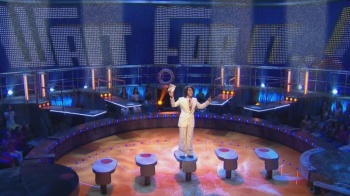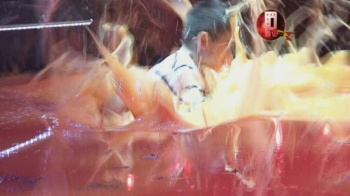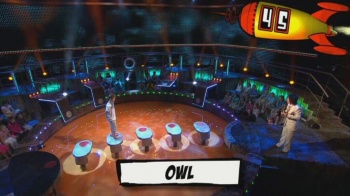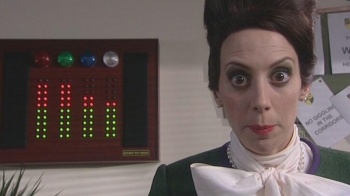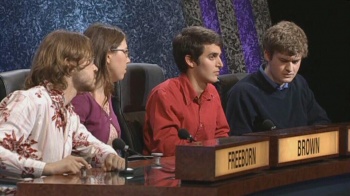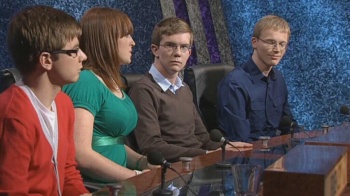Weaver's Week 2009-09-27
Last week | Weaver's Week Index | Next week
We were very pleased to read this week that the BBC is investing more money in its childrens' shows. This column has long argued that making relevant programmes for young people is one of the core duties of any public service broadcaster, and it's good that at least one of them is living up to that criterion. The 4.05 slot is currently branded the Game Show Zone, with something fun every day of the week. We'll be reviewing Raven on (or about!) 22 November, when the current series ends, but here are the other two programmes currently in the zone.
Contents |
Wait for It..!
BBC Scotland for BBC1, 4.05 Wednesday and Friday
| The stars of the show are four children, one presenter, and a huge tank of BBC gunk. Suggestions have been made that the contents of the tank used to be that woman who's on after Newsround before she got too close to the fire. These suggestions have been denied by her official spokesman.
The presenter is Pete Firman, the magician who really impressed us as host of the hidden-camera show Stake Out last year. The children are competing to win some really rather nice star prizes, and avoid a drop into the Goo Portal. That's the tank filling the studio. It bubbles up from time to time, as though someone were shouting "bogies!" underneath the surface. If we're to believe the backstory, the game is being played on an intergalactic starship, and the gunge will transport the losing contestants back to Earth faster than something very fast indeed. It's entirely ludicrous, and not even the programme believes its own myth for longer than it takes to explain it. However, this does allow for a rather good physical construction, with almost all the action taking place on the edge of the pool, and bridges forcing the players out over it towards the end of each round. There's a computer-generated backdrop which counts up the question period, and displays a simulated waveform as the questions are read out. | |
| The show's questions are read by the ship's computer Tim (Tim Dann), and consist of Going for Gold-style questions, gradually revealing the facts. The questions have been carefully constructed to make the answer fairly obvious after about eight seconds, but to contain some additional information so they last for 15 seconds.
Why is this additional length important? Ah, what did we say the show was called? Wait for It..! Like The Waiting Game, there are more points available for people who wait longer before giving the correct answer. Ruby Wax's quiz first aired in 2001, when many of the contestants will still have been in nappies, and gave questions that were sharp and to the point, and all the attention was on the tactics. The junior edition prefers a slightly more discursive approach. Round one, then, is played by all four players. There are precisely ten questions in this round, and each second of the clue heard is worth one point. Give the correct answer, those points are yours. Give a wrong answer, the points go to every opponent. Even worse, each contestant is allowed to give only three answers across the round, whether correct or erroneous. After three buzzes, that's it, they can't answer any more. After the questions are answered, the four step out over the pool, and the player with the smallest score finds the bridge falling away, leaving them suspended a metre above the Goo Portal. Unless they're able to employ cartoon physics, or remember that if they're in space they'll be floating anyway, they're going down. | |
| Round two is broadly similar. Just six questions this time, and rather than buzzing in during the clue, the contestants must first bid to take the question. The first player to buzz in will have done so after some seconds, and will receive that much of the question – if they buzz after nine seconds, they'll get nine seconds of the question. That many points for a correct answer, but if they're wrong, the question continues and their opponents may answer – it's the only way they'll score. Again, there's a limit of three answers per person, and the lowest score is in the gunk.
Round three asks each player in turn to predict how long their opponent will take to answer a question: will it be 5 seconds or less, 11 seconds or more, or 6-10 seconds. Should the opponent give the correct answer during the nominated window, the predictor scores a point. If the opponent gives the correct answer at any other time, the player answering gets the point. If the opponent gives the wrong answer in the nominated time, the question is handed over, and the predictor can answer. And if the opponent gives the wrong answer in a different time, no-one scores. It's slightly more simple when Pete explains it, because he only explains the bits that need to be explained. We can see some merit in this structure: the nominator can only score if their opponent stops in the chosen time, and the opponent can only score if they get the question right in the wrong time. | |
| The only problem is that this structure has a hole so large that satellites are orbiting through it. Little Howard's ego (and the entire Jaime Alguersuari fan club) could fit into this hole. If the person who's supposed to be buzzing doesn't buzz in, no-one will score a point. And if they buzz in after one second and give a nonsense answer, the opponent can only score if they've a) nominated 1-5 seconds and b) can answer after one second's clue. It's a wonderful way to protect the lead, and we suspect that one or two children are wise to it already. Whoever has the more points after five questions wins.
The final is almost a copy of The Waiting Game: it requires correct answers to six questions in less than a minute. Unlike Ruby's show, money isn't in the equation: rather, the contestant must take at least 40 seconds to give their right answer. Each correct answer is represented by a step on stepping stones across the Goo Portal, and it's a surprisingly difficult round to win. There's a lot to like about this show. We do like Pete Firman, and we do like the basic concept of getting more points for waiting longer. They've even managed to resolve one of the problems that beset The Waiting Game, by limiting each contestant to three answers in the early rounds. The final round would benefit from having the stepping stones automatically tip up without warning when the minute was up, but we've no doubt that the Health 'n' Safety elves would throw a wobbly. In a safe and healthful manner, naturally. But that head-to-head final really is a complete mess: in a best-of-five format, it should be really difficult for neither player to score. Our back-of-the-comic solution only changes what happens if the player buzzes and gets the answer wrong. Their opponent gets to hear the remaining clue up to the time they've selected (so 5, 10 or 15 seconds, or more if more has been read) then can answer. Sort out that round, perhaps find a more credible setting for the show, and it has some promise. |
School of Silence
Lucky Day for BBC1, 4.05 Mondays
| We have surprisingly little to say about this show. Sorry.
Barney Harwood presents, so it should be brilliant because everything Barney does is brilliant. The setting is a school where the headmistress Miss Gobstop (Natacza Boon) is a stickler for quiet, silence, and looking a bit like Sally Smedley. She's assisted by various teachers, a dinner lady, and (for no adequately explored reason) a retired army colonel. Into this haven of tranquility must enter some children, for what school would be a school if it lacked children? The children in the School of Silence are selected for their noisiness and general inability to keep quiet. They're so loud that the jumbo jets have asked them to pipe down, that kind of thing. During the day, the children will take part in four activities, three in simulated classrooms and one in the canteen. Each activity will involve one of their number getting mucky and gungy, while the others try their hardest not to laugh, shout, cackle, or giggle. The player who gets gunged is chosen from a bottle of coloured gobstoppers, and the teachers give them feedback after each challenge. Miss Gobstop has microphones all around the school, and a display in her office (the Gobstop 2000, no less) will show who has been noisy. | |
| These are just training exercises. To win the prize, the children must survive a session with Colonel Kittens (George Sawyer) while making no more than two loud noises. The Colonel will tickle them, gunge them, and do anything he can to make them make noise. If the children are able to resist the temptation to emit so much as a gentle snigger, they'll be rewarded with the Golden Gobstopper. Failure means they're expelled before the end of the show.
At heart, this show is an excuse for children to get gunged. There is some decent public service value in there, suggesting social benefit in delaying the release of loud noises, but it plays second fiddle to the mess. Though the endgame is all-or-nothing, it has some merit because the children are shown to be loud and noisy, and they do make a real effort to keep quiet. To be honest, the gameplay wasn't our favourite part of the show. The acting was top-drawer three-dimensional cartoon brilliance: Miss Gobstop reminds us of our primary school's resident dragon, and Colonel Kittens is a suitably barmy soldier-turned-PE teacher. All the actors turn in suitably over-the-top performances, and they help to rescue an underwhelming game. |
The Round Britain Quiz-style question was a little more cryptic than usual. "What a wonderful day! It's quarter to three, I wish I could stay like a child at play in the cool cool cool of the evening."
Countdown Update
Did we really not run one of these over the summer? Crikey. Jacqueline Baker was the carry-over champion from the last series, she completed five wins in June, before Nilesh Patel and Clive Brooker each won one game. Innis Carson became the first octochamp during the Wimbledon heatwave, scoring a total of 861 with seven centuries. Anne Hughes and Micheal Harris both had one win, and the latter player's one-win total of 190 is the highest since the Whiteley era.
He was beaten by a star: Andrew Hulme came in with 133 points, scored six more centuries, and went out with a score of 128, bringing his octochamp total to 930. In the last series, Kirk Bevins' eight-game total was a mere 925, and we reckon Andrew had more room for improvement. Paul Varlaam tried to follow that, his five wins straddled the summer break. Ed Rossiter won three games, but fell to Chris Davies, the long-haired gentleman who secured his octochamp status with 892 points, seven centuries, and the highest score of the series so far – 139 points. Bob De Caux recorded five victories, but lost a good game to Jeffrey Burgin. He's gone on to complete his octochamp run, scoring 685.
As things stand at the moment, the seedings are:
| Andrew Hulme | 8 | 930 |
| Chris Davies | 8 | 892 |
| Innis Carson | 8 | 861 |
| Jeffrey Burgin | 8 | 685 |
| Jacqueline Baker | 5 | 510 |
| Bob De Caux | 5 | 505 |
| Paul Varlaam | 5 | 483 |
| Ed Rossiter | 3 | 373 |
University Challenge
Heat 11: Magdalene Cambridge v St Hugh's Oxford
| It's still (technically) summer, but we've already reached the point at which we know what the sides have to do to return. 180 will bring any side back, 160 gives them a very good chance. "Intellectual tiddlywinks", we're told we're playing this week. Odd, we thought it was a quiz, so fingers on buzzers.
St Hugh's get the first correct answer, "Darwin". The college was founded in 1886 by Elizabeth Wordsworth, a great-niece of the poet. It was all-female until the 1980s, and famous alumni include racing critic Emily Davison, transport minister Barbara Castle, and elected Burmese leader Aung San Suu Kyi. Magdalene Cambridge get under way with the next starter, "Dangerous Liaisons". Though founded in 1428 to help keep monks away from the other attractions of the city, the student Samuel Pepys was thrown out for getting drunk. The college added an "e" to its name in the 19th century because too much of its post was going to that other institution in Oxford. Magdalene get the remaining starters to the first visual round – stills from films of Stephen King novels – and lead 70-15 afterwards. | |
| We've surely had a question about the definition of a "Picaresque" novel on this show in the past, it's the only way this column remembers said definition. After a missignal, Thumper tries to fine one of the contestants five pints, and we wonder if he's making a surreptitious bid to host the Mssng Vls round, or just invoking the spirits of Pepys. Hic! It's either that or he's trying to paint the ceiling while sitting, as he thrusts his hands up when one of the St Hugh's side bangs her buzzer and shouts out the answer in a high state of excitement. It's been a show of two halves: all Magdalene in the opening minutes, all Oxford in the second quarter, but the Cambridge side gets the audio round – 19th century classical works, to which the answer may be Strauss but they've got to say which! – and leads 80-50.
St Hugh's get the Wordplay question of the week, and it's about postcodes: Chester + Ipswich = CHIP, that kind of thing. They have a chance to pull level after getting the current locations of three of the Seven Wonders, but still trail by five, and Magdalene pull further away. The second visual round is on the works of Titian, the panel is well-and-truly beaten, and Magdalene's lead is 110-90. This puts St Hugh's into the lead:
| |
| Good buzzer work, there, but the bonuses are a little lacking. Magdalene prove a little lacking in knowledge of world leaders circa 1960, and the sides are level again. Neither side remembers which pre-decimal coin was immediately larger than a florin, and there are many dropped starters before St Hugh's finally get something – anything! – right. It means every player has at least one starter correct this week. That the Exe and Wye are homophones for letters of the alphabet popped up on Round Britain Quiz last year, and at the gong, the scores are tied at 135-135.
Ties in this game are not allowed to persist, so an additional starter has to be asked. It's correctly answered by Alex Economides, and St Hugh's has won. He got three starters in the main game, level with Paul Glenton, and the side had 11/24 bonuses correct. Liam Brierley was on the buzz for Magdalene, three correct answers and neither of the two missignals. The Cambridge side had the answer to 9/27 bonuses. Next match: York v St George's London | Repechage standings:
|
Mastermind
Heat 5
"It's the toughest test on television," says the bloke talking. Excellent! He'll shortly transform into Victoria Coren, first lady of Greek letters, and we'll all connect more.
Or not. Adam Lister will tell us of the Life and Films of Groucho Marx. Marx (1890-1977) was the Anne Robinson of his day: famed for insulting his audience, famed for hosting a hugely popular game show, and famed for his greasepaint moustache. Annie never quite mastered that last one. You Bet Your Life ran from 1947 to 1963, and featured Groucho's insult, innuendo, double entendre, and a duck with a prize in its beak that descended if the contestants mentioned the Secret Word of the Day. One of these years, we'll have to find a copy of the show and deliver a Marxian analysis... Like WC Fields, we'll never be as funny as Marx, and we're glad that there are a few choice quotes. 13 (3).
Penny Billyeald takes the Novels of Dorothy Whipple, a subject so obscure that the PSC backdrop is... a pile of books. Whipple (1893-1966) was a native of Blackburn, who later moved to Nottingham. Her books include "They Knew Mr Knight" and "They were Sisters", both subsequently made into films. JB Priestly described her as "the Jane Austen of the twentieth century", but posterity did not agree with this assessment. Many close misses, a fair few passes early on, and a good recovery to finish on 10 (5).
Mike Hely discusses the Battle of Britain. Do we have to explain this one? Very well. The Battle of Britain (1940) was a defensive operation by the British military, particularly the Air Force, against an attempted invasion by the German military. Lots of questions about the details, and individual acts of heroism, ending on 10 (0).
Our final contender is Tom Hutchings, telling us about the Life and Works of Thomas Arnold. Arnold (1795-1842) was the headmaster of Rugby school, where his stated aim was to make Rugby a Christian school producing Christian gentlemen. To enforce the moral code, he refined and popularised the prefect system, under which older boys served as monitors and mentors to keep discipline amongst their juniors. Though the round starts with a pass, that's as bad as it gets, the contender picks up speed at a great rate, ending on 15 (1).
- Les Morrell 26 (3)
- Colin Wilson 25 (0)
- William de Ath 25 (4)
- Vishal Dalal 23 (4)
- Mike Hely 21 (5)
- Adam Lister 21 (5)
Penny Billyeald remembers Connie's character on Fawlty Towers, and what the letters "AM" (as in before noon) stand for. She shows her clear coolness by failing to remember the singer of "Achey Breaky Heart", and we must again apologise to all readers for bringing that memory back. 21 (9).
Mike Hely knows the most southerly Channel Island, and the claim to fame of Timbuktu, and the maker of the Ford Edsel. 21 (5).
Adam Lister needs nine for the lead, thirteen for a good shot at the repechage. He does well on questions about the Arctic, remembering Sarah Palin, the former governor of Alaska, and the leaf on the Canadian flag. We'll raise an eyebrow over the suggestion that Victoria was a British prime minister. 21 (5).
So, seven for Tom Hutchings to win, six and five passes to set a three-way play-off, which we've surely never had before. Though he zigs with Pengiun on the publishers of "Peter and Jane" (it's Ladybird), he passes the winning post with some time to spare, and only then starts to pass. 23 (4) is a win.
With a tie for second, we can bring the repechage board out a week sooner than we might.
This Week And Next
We wrote last week about useless MPs blethering on about how unfair it was that ITV was scheduling its least-unpopular programme opposite one of the BBC's more Rethian efforts. Steve Williams at Off the Telly did what we should have done, and dredged through the archives to find that such clashes were regular in 2005. And in 2006. And in 2007. Only last year did the BBC allow Mr. Cowell to put out his promotional vehicle without being slaughtered by a greater talent, like John Sergeant.
We also note that the attack on the BBC is being led by News International, which owns 18% of ITV and operates a "rival" television network with neither the reach nor the influence of Channel 5. News International's chair, Prince James Murdoch (he only got his position through an accident of birth), said last month that the BBC was "too large" so can hardly be held as a neutral observer in the matter. See also: the entirely fabricated press hype about Alesha Dixon's performance as a judge on Strictly. Leading the charge of "she's rubbish" are newspapers run by, er, News International.
In The Independent, Dominic Lawson opined that the BBC should restrict itself to areas where the commercial sector fails. We entirely disagree with this premise: the BBC is allowed to use large chunks of the public airwaves, and is funded through a near-universal tax, so it is right that it returns something to the whole population. Furthermore, a healthy public broadcaster helps to drive up standards by providing a benchmark against which other channels can be compared. Indeed, isn't ITV doing exactly that: coming up with a wildly popular show that is able to match Strictly in the court of public opinion? Would it be able to do this if the public sector rival were putting out nature shows on the flightpath of the Kampuchean moth?
And then we heard how the Arts Council has released its annual Taking Part report. In these surveys, the organisation attempts to measure how many people are participating in various forms of artsy activities – from pop gigs to art school, woodcrafts to acting, and so on. Over the survey period, from 2005 to 2008, dance has shown a rise every single year, and the Arts Council speculates that some of this is the Brucie Effect. If there is a link between Strictly and people emulating their heroes from television, then the show is clearly fulfilling a public service. It's less obvious that Simon Cowell's programme is doing anything to benefit the greater good, rather than its creator's pocket.
In the ratings to 13 September, ITV makes a clean sweep – 11.3m for Simon Cowell Annoys, 5.05m for The Cube, and 3.45m for Millionaire. Fourth place goes to University Challenge, 2.95m saw that week's match, just ahead of Mock the Week (2.9m) and Dragons' Den On Tour (2.65m). Mastermind's doing far better than last year, 1.9m saw the heat, with 1.75m tuning in for The Restaurant The Winners' Story.
Cowell on the digital tier, too, with 1.43m seeing Xtra Factor, 1.40m the Sunday repeat. 1.07m viewers for Come Dine With Me on More4, and that's 60% of the audience on Channel 4. Four Weddings crashed through the half-million mark, 525,000 saw this week's edition, and Masterchef Goes Large came to UKTV Watch with 100,000 viewers.
The RBQ question was composed entirely from lyrics by Johnny Mercer. In order: "What a wonderful day!" from Zip-a-dee-doo-dah. "It's quarter to three" comes from the drinking song One for my baby (and one more for the road). "I wish I could stay" comes from Baby it's cold outside. "Like a child at play" is from Days of wine and roses, and "In the cool cool cool of the evening" is the title to the song. There was another clue in the highlights line, "waiting round the bend" from Moon River. Johnny Mercer (1909-76) wrote songs for films and the stage for four decades, and the six above are just a few of his best-known works.
So, waiting round the bend this week: Strictly is joined by Dancing With The Stars (UKTV Watch, 9pm Monday), and – for viewers in Ireland – An Gig Jig (TG4, 8.30 Sunday). In original ideas watch, Never Mind the Buzzcocks has guest hosts (BBC2, 9.30 Thursday), and next week's Week begins our six-part collector's guide to the best game shows of the decade.

